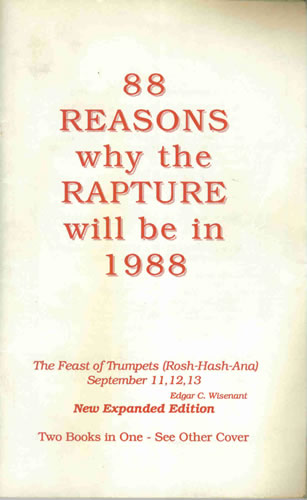Sensationalist Dispensationalists
by Jerry Robinson at JerryRobinson.org
I have been an avid student of Bible prophecy since 1989. And if my brand of prophetic interpretation must be categorized, then categorize me as a dispensational, premillennial, pretribulational literalist. I'll wear that that title proudly. I believe it, research it, write about it, teach it, and preach it. However, despite spending hundreds of hours poring over ancient historical texts and the ancient Biblical prophecies themselves, you can be sure that I will not, nor do I ever intend to, force my opinions and conclusions upon anyone. Share yes, force no. In fact, some of my least favorite people include those who insist that their interpretations of Bible prophecy are bulletproof. In my humble opinion, I have always found it counterproductive to become dogmatic about your opinions of Bible prophecy.

|
Since I hold a Grammatical-Historical (Literal) hermeneutic, I am comfortable with being dogmatic upon many of the Biblical themes: Christology, Soteriology, Eclessiology, etc. However, when it comes to Bible prophecy, I believe that one must tread carefully. An attitude of certainty does not always imply ever-increasing faith. Many times it can imply blind pride. The only way to receive revelation from the Lord is to remain open and receptive through a spirit of patient expectance and humility.
Those who are dogmatic in their discussion of prophecy produce at least two types of respondents:
The first type of respondent usually resents a dogmatic position on something as fluid as eschatology. They are usually turned off by the smugness of the prophecy 'expert' as he explains his unique and 'enlightened' understanding that will light the path of all that follow in his footsteps.
The second group of respondents include the gullible and weak-minded. There are those who gullibly embrace and assimilate any and all strong opinions concerning a difficult topic such as eschatology. The apostle Paul indirectly warned against such gullibility when he praised the Berean church for their healthy skepticism. (Acts 17:11) The scriptures reveal that the Bereans were steadfast in examining Paul's message in light of the written Gospels. How many Christians today double check unusual messages that they hear with scripture?
In addition, this second group brings to light a problem facing the Body of Christ in our modern era. Many people today often tend to shy away from the study of prophecy because of its intricacies and therefore tend to lean upon, and completely trust, those who claim to have an understanding of it. In our generation we have seen many popular prophecy teachers whose words become gospel truth as soon as they are uttered. This type of power tends to produce a sense of pride in one's ability to discern current events and other matters related to eschatology.
Here is wisdom: Avoid anyone who claims to have it "all figured out."
Example: The man or woman selling you the end-times answers on your television set "for only $19.95" is more than likely fleecing you. The answers are in Bible. You do not need a Bible prophecy expert to show you the way through the forbidden forest of eschatology. What you simply need to have is a ready mind, a perceptive spirit, and an ability to read. (READ 2 Peter 1:20,21)
I repeat, avoid those who claim to have it all figured out.
Are certain things clear in the Bible regarding the end times? Certainly! Much of the revelation we have today regarding the end times came about through the laborious research and fervent prayers of faithful servants of God who may remain faceless and nameless until the day they are honored in Heaven before the Judgment Seat of Christ. However, much of what lies ahead, and its exact order, should be a discussion, not an intellectual jousting match.
However, I should add that most of the modern prophecy teachers that I have met and know personally are good people. They know (and some even admit publicly) that everyone has a flawed eschatology. (No one has a perfect eschatology. If this statement offends you, then this article was written especially for you.) But thankfully, a flawed eschatology will not keep a man out of heaven.
So it appears that I have come full circle. Since our faith in Jesus Christ as Savior and Lord is what determines our ultimate destiny, modern-day Christians should focus upon "reaching the lost and teaching the found." I mean really... Does it really matter if you are pre-trib or post-trib when, right now, 2.7 billion people have never heard the name of Jesus? The Global church has work to do and that work begins with you and I. When Christ returns, which we all believe will be very soon, let us be found busy about our Father's business -- saving souls. (Matt. 28:19-20) Let's not let Him find us debating and squabbling over obscure texts that serve only to "engender strife." (2 Tim. 2:23)
2.7 Billion people are waiting to hear about Jesus' first coming while many in the Body are arguing about the logistics of His Second coming. Let's proclaim the gospel of Jesus' first coming with fierce tenacity and discuss the good news of Jesus' Second coming with mildness, gentleness, and in love.
Arise, Church. Your greatest hour has come.
"The harvest truly is great, but the laborers are few: pray ye therefore the Lord of the harvest, that he would send forth laborers into his harvest." (Luke 10:2)